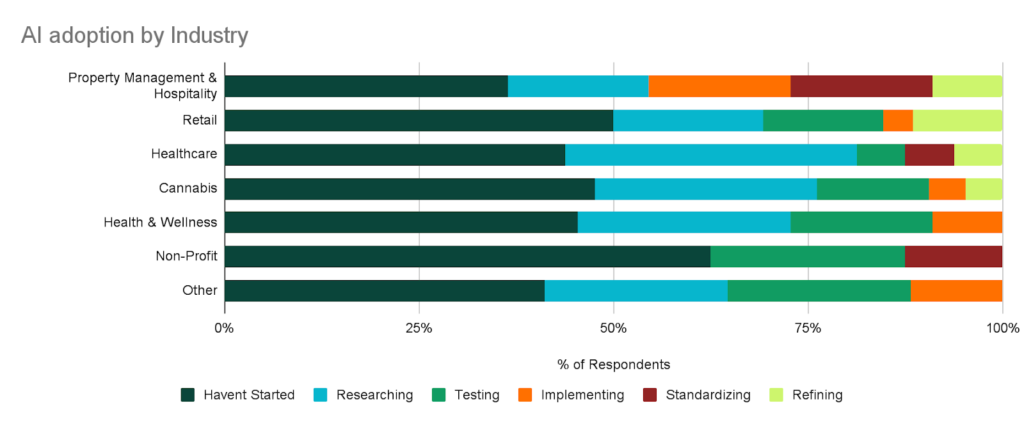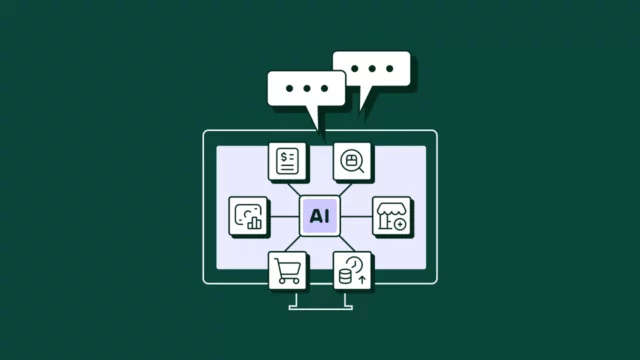ChatP2P: How Back-Office Teams Are Using (or Wrestling With) AI

ChatP2P: How Back-Office Teams Are Using (or Wrestling With) AI
Everyone’s heard about ChatGPT, but why does it seem like nobody wants to chat P2P? Despite the widespread hype about AI for procurement, operations, finance, and accounting, many back-office professionals are still unsure about which AI use cases will actually impact their daily workflows. This uncertainty has driven hesitation in AI adoption – but businesses that don’t take advantage of its capabilities now risk falling behind their competitors. So, how can you get started and identify the best use cases for your needs?
To cut through all the noise and understand how back-office teams are – or aren’t – using AI today, Order.co conducted a survey that drew responses from a diverse array of industries and roles. Read on to uncover how your peers use AI for procurement and help inform your adoption strategy.
Join us for an upcoming live conversation: register for ChatP2P: AI & the Back Office today
The AI early movers’ advantage in the back-office
Expectations amongst survey respondents vary, but most teams anticipate incremental improvements from AI vs. sweeping transformations:
- 67% believe AI will help them save a few hours per week.
- 23% expect moderate cost savings from AI automation.
- 10% foresee significant error reduction (70%+ improvement in data accuracy).
Overall, respondents perceived error reduction as having the most significant impact on their workflows over cost and time savings. Human error is a challenge for every role and industry, with data entry having an error rate as high as 4%. In the United States alone, the cost of these errors amounts to about $3.1 trillion per year. Just imagine how much your business could save by completely eliminating human error.
Even though respondents recognize that AI will reshape their roles, few have taken meaningful steps toward adoption.
- 88% of respondents have evaluated fewer than 5 AI tools in the past 6 months.
- Less than 15% have implemented or are actively using AI tools.
- 46% have not started evaluating AI tools in any capacity.
This data revealed that many back-office teams feel overwhelmed by the sheer volume of options on the market. There’s also a widespread perception that AI might replace human talent. In reality, it serves as a copilot with the power to enhance decision-making, automate tedious tasks, and eliminate inefficiencies – while keeping people at the center of strategic operations.
As new AI applications continue to launch seemingly by the minute, teams that integrate them now will gain a competitive advantage. Waiting too long may mean playing catch-up while competitors enjoy a lower cost of goods and optimized back-office workflows.
Top use cases of AI for procurement, finance, and accounting
Although AI adoption in back-office roles is still in its early stages, teams are beginning to recognize the ways that it can simplify their daily workflows. As businesses in every industry start to explore AI’s capabilities, certain use cases stand out as particularly valuable for those in procurement, finance, and accounting roles.

“When you look at industry adoption, about half across most industries are not exactly sure to get started,” noted Eric Hann, VP of Marketing at Order.co. “Most respondents were saying things like [lack of] talent and budget were the biggest reasons that they hadn’t taken the jump.”
Although teams in many industries face roadblocks in their efforts to get started with AI, that hasn’t tempered their excitement about adopting it in areas that will directly help them with their jobs:
- Procurement and operations teams see AI as a way to quickly extract insights from data, automate purchasing processes, and control spending.
- Finance teams leverage AI to run monthly reports and assess the business’s financial health.
- Accounting teams use AI to simplify the month-end close process and reduce manual data entry.
Across teams, one theme is clear: AI’s greatest perceived value lies in its ability to simplify complex, time-consuming tasks while empowering employees with better data. While the enthusiasm around AI’s potential grows, it’s critical to apply it effectively in your workflows.
How to incorporate AI for procurement workflows
Learning new technologies or processes can feel daunting, but teams that invest in AI for procurement applications stand to boost their bottom line – and without much turnaround time. “You should see immediate ROI on an AI investment,” said Matt Garippa, Chief Business Officer at Order.co. “Think about these tools as something that allows you to get multiple units of work, whether that's cost savings, products evaluated, revenue generated, time allocated.”
So, how can your procurement team experience these benefits? AI-powered procurement tools offer built-in features designed to make your life more productive without adding extra work to your plate. Not to mention that when employees aren’t bogged down with repetitive tasks like checking countless vendor websites for the best prices or searching for order tracking links, they’re much more likely to be happy at work.
AI use cases in procurement include:
- Automating repetitive tasks like price comparisons and purchase orders.
- Offering insights from large data sets to help teams make smarter buying decisions.
- Identifying savings opportunities in real time to reduce costs
- Tracking historical vendor performance data and identifying potential risks.
Early adopters will benefit the most. Back-office teams are just starting to adopt AI for procurement tasks, and those who are further ahead are already gaining hours of their time back and slashing costs by up to 20% with autonomous sourcing. The sooner you get started, the more time you’ll have to train the AI and find the ideal balance between AI automation and the human touch.
How Order.co helps you get started with AI for procurement
Order.co’s proprietary pricing AI solution is designed to act as your copilot. It can:
- Scan 42,000+ vendor websites to identify the best product prices, saving businesses an average of 5% on purchases.
- Offer context-aware product recommendations based on each location, department, and user’s unique preferences.
- Predict fulfillment issues and proactively offer replacements to avoid supply chain disruptions.
Ready to see how AI-powered procurement can work for your team? Book a demo to discover how Order.co’s AI can offer your business a strategic advantage.
Get started
Schedule a demo to see how Order.co can simplify buying for your business.
"*" indicates required fields



